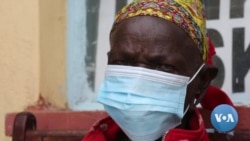Kenyan authorities are working to eradicate trachoma, an infectious disease that is a leading cause of blindness in Africa. About 7 million people in central Kenya are at risk for the disease.
As Elizabeth Partoti, sits outside a clinic in Kajiado county in Kenya, she stares, unseeingly, into the dry and brittle spaces outside the health facility. In a few minutes a surgeon will carry out a corrective eye operation and allow the more than 70-year-old woman to see clearly for the first time in over a decade.
She is one of thousands of people in Kenya who have either lost or are gradually losing their sight due to trachoma.
“My eyes have been bothering me because I have grown old,” she said. “The eyelashes are always getting into my eyes, causing me a lot of pain, my granddaughter has been helping, removing them physically with her fingers, but it is very painful.’’
Trachoma is caused by bacteria that attack the inner surfaces of the eyelids.
Dr. Peter Ekwum, an eye surgeon who has been carrying out trachoma surgeries in Kajiado county, says sight loss from trachoma is preventable but irreversible if not treated in time.
“Every time you blink, the eyelashes rub on the cornea and with time they peel off the first layer of the cornea, which results in an ulcer,” he explained. “The ulcer is very painful, but at the end of the day, the ulcer will heal and leaves a scar.”
That repeated scarring of the eye’s cornea eventually impairs vision and often leads to irreversible blindness.
About 7 million people live in 12 central Kenyan counties where trachoma is endemic because of a dry climate and the pastoral and nomadic lifestyle there. Flies in the area help spread the disease.
About 53,000 people are currently infected with the disease.
Like other countries affected by trachoma, Kenya had wanted to eliminate it by 2020, the World Health Organization’s target. The target date has now been moved to 2023. Dr. Ernest Barasa, Kenya’s National Trachoma Coordinator, said, “The way forward for Kenya in the trachoma elimination program is to clear the remaining trachoma trichiasis backlog, which stands at around 5,000 at the moment. That is 5,000 people who require urgent surgeries to avert blindness in the 12 trachoma-endemic counties.’’
To eradicate trachoma, experts say, people in areas prone to the disease must take greater precautions.
Most of the communities at risk are nomadic, sometimes living with livestock.
“The flies breed because of the dung and urine,” Ekwumm the eye surgeon, said, “and now because the flies are breeding, every time they discharge in a child’s face, the bacteria is carried from the children to the mother.”
Kenya’s plans to defeat trachoma depend on donors for the money for detection, treatment and prevention programs.
Only with more contributions, Kenya says, will it be able to eliminate the disease.





